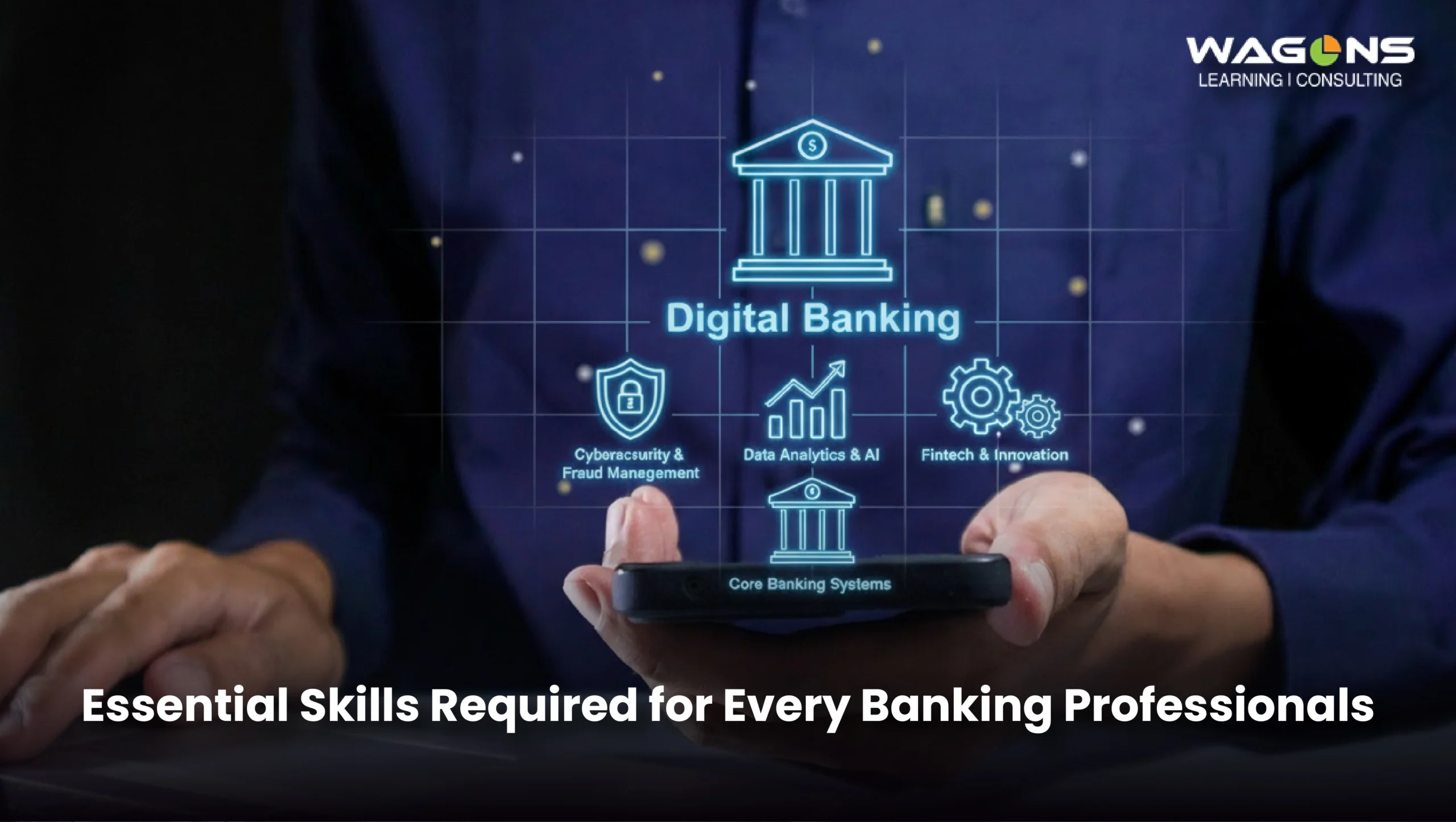Key Takeaways:
Digital transformation is no longer optional; it’s a core survival strategy for Indian banks.
A significant gap exists between the traditional skills of the current workforce and the digital demands of the modern BFSI sector.
Strategic upskilling in five key FinTech areas: Data Analytics, Cybersecurity, Digital Product Management, AI, and Customer Experience (CX), is crucial for staying competitive.
Partnering with a specialized training provider is the most effective way to build a future-ready workforce.
Why Employee Upskilling is a Core Business Strategy
Your banking employees are struggling to keep pace with digital-first customers. While your customers complete transactions in seconds using UPI, your workforce often relies on legacy systems and outdated processes. This isn’t just an operational issue; it’s a critical business risk. In today’s BFSI landscape, your bank’s competitive edge is no longer defined by the size of your branch network but by the speed of your app and the skills of your people. Reskilling your employees isn’t an HR initiative; it’s a strategic imperative that directly impacts customer retention, operational efficiency, and your bottom line. Investing in your workforce is investing in your bank’s future.
How Digital Transformation is Reshaping Indian Banking System: FinTech Revolution
India’s financial landscape has shifted dramatically. The country is now the undisputed global leader in digital payments, a revolution driven by groundbreaking platforms like UPI.
The numbers tell a powerful story:
India’s UPI platform is projected to process over 1 billion transactions per day by 2026–2027, a staggering figure showcasing the nationwide shift to digital. (Source: Indianarrative)
FinTech adoption in India stands at 87%, the highest in the world, far surpassing the global average. (Source: EY Global FinTech Adoption Index)
Over 80% of banking customers now prefer digital channels for their primary transactions, making your mobile app your most important branch.
This transformation means traditional banking roles are evolving at an unprecedented pace. Relationship managers need data skills, branch managers need digital product expertise, and back-office staff must understand automation. The question isn’t whether jobs will change; it’s how quickly you can equip your employees with the skills to thrive in their new roles.
Identifying and Closing the Modern Skill Gap in Banking Workforce
The core problem facing Indian banks is a deep-seated skill mismatch. Your employees are experts in traditional finance, but they often lack the digital fluency required for today’s technology-driven operations.
The Data Dilemma: A recent industry report found that less than 40% of banking professionals feel confident in their ability to interpret basic data. Yet, modern banking relies on constant analysis of customer behavior, transaction patterns, and risk indicators.
The Automation Challenge: Robotic Process Automation (RPA) now handles up to 70% of routine tasks like account opening and compliance checks. This shifts the human role from execution to oversight, a function requiring new skills in monitoring, data interpretation, and exception handling.
This gap creates a strategic vulnerability. Banks that fail to invest in corporate training for banks and reskilling their BFSI employees will be outmaneuvered by more agile, tech-savvy competitors.
The 6 Most In-Demand Skills for a Future-Ready Banking Workforce
Upskill or Fall Behind: To build a future-ready workforce, your BFSI training programs must move beyond foundational product training and focus on these six critical, interconnected competencies.
1. Data Analytics & Business Intelligence Training in BFSI
Every transaction, from a Current Account, Savings Account, Demat entry to a Merchant Banking payment, tells a story. Your employees need the skills to read it. Data analytics is the engine of modern banking, enabling everything from personalized marketing to advanced risk management.
A data-fluent employee, from a Personal Banker to a Corporate Banking strategist, can:
– Analyze transaction histories to identify cross-selling opportunities for products like Life Insurance, General Insurance, Mutual Fund.
– Detect anomalies in Credit Cards, Debit Cards, Prepaid Cards usage that signal potential fraud in real-time.
– Segment customers for hyper-personalized marketing campaigns in NRI Banking or Wealth Management.
– More accurately predict loan default risks for Retail Assets and SME banking.
Learn more about our specialized BFSI Training Program for Employees.
2. Cybersecurity Fundamentals Training in Financial Services
Cyber attacks on Indian financial institutions rose by over 40% in the last year, with the average breach costing a bank nearly ₹18 crore. Essential cybersecurity training, critical during any Company Induction, must cover:
– Identifying sophisticated phishing and social engineering attacks.
– Securely managing sensitive customer data and credentials.
– Following strict access management protocols, a core part of System Training.
– Implementing immediate response procedures during a security incident.
One click on a malicious link can compromise your entire network.
3. Digital Banking Product Training & Process Fluency
Your mobile app and digital platforms are your new branches. Staff who understand how modern banking products, from Retail Forex to a Payment Gateway, are built, managed, and integrated can provide vastly better customer support.
Training for digital fluency should include:
– Fundamentals of User Experience (UX) and how it impacts customer satisfaction.
– A deep understanding of the end-to-end digital Process Training for all core products.
– Basics of performance monitoring and troubleshooting common customer issues.
4. AI and Machine Learning in FinTech Training
From chatbots enhancing Customer Service to AI models assessing credit risk for Microfinance, artificial intelligence is everywhere.
AI in finance training should demystify:
– How AI models make decisions and recommendations.
– The limitations and potential biases of AI systems, a key aspect of Risk Management.
– When human oversight and skills like Decision Making are needed to override an automated process.
Get a Demo on our specialized Corporate Banking & Finance Training Program.
5. Holistic Customer Experience (CX) Design
A seamless journey is what separates market leaders from laggards. This requires blending strong interpersonal skills with digital savvy. CX excellence is the practical application of essential skills like:
– Customer Service and Communication Skills
– Business Etiquettes and Telephone Etiquette
– Problem Solving to identify and eliminate friction in digital processes.
This mindset shift from transactions to experiences is what transforms a standard Branch Manager Induction into a program that creates true leaders in customer satisfaction.
6. Tech-Enabled Sales and Relationship Management
Traditional Selling Skills and Negotiation Skills are still vital, but today they must be amplified by technology. A modern Relationship Manager or Sales Executive needs to be a master of both the art of the deal and the science of the CRM.
This skill set, crucial for any Sales Manager Induction, involves:
– Using data analytics for strategic Key Account Management.
– Leveraging digital tools for effective Channel Management.
– Applying advanced Presentation Skills for virtual client meetings.
– Combining Creative Thinking with CRM data to build a stronger pipeline.
By integrating these six modern skill sets into your Domain Training, you empower your employees to move beyond just knowing your products to confidently growing your business in the digital age.
Ready to Close Your Banking Skill Gap and Secure Your Future?
Transform your banking workforce with proven banking training solutions. Partner with Wagons Learning for your BFSI Training Program. Request a Custom Training Consultation Today.
How to Build a Future-Ready Banking Workforce
Random training workshops don’t work. Employee upskilling for BFSI requires a structured, customized approach.
Assess Current Capabilities: Begin with a thorough skill gap analysis across all departments to identify your most urgent needs.
Design a Relevant Curriculum: Develop a FinTech learning roadmap with content and case studies specific to the Indian banking context.
Deploy Blended Learning: Combine the flexibility of self-paced online modules with the engagement of Virtual Instructor-Led Training (VILT) and hands-on workshops.
Measure and Iterate: Track the application of new skills on the job and use feedback to continuously refine your training programs.
A customized approach delivers tangible results, including 40% higher completion rates and 65% better skill retention compared to generic training.




